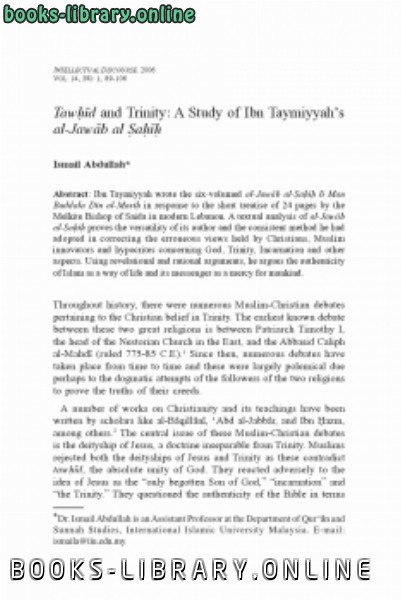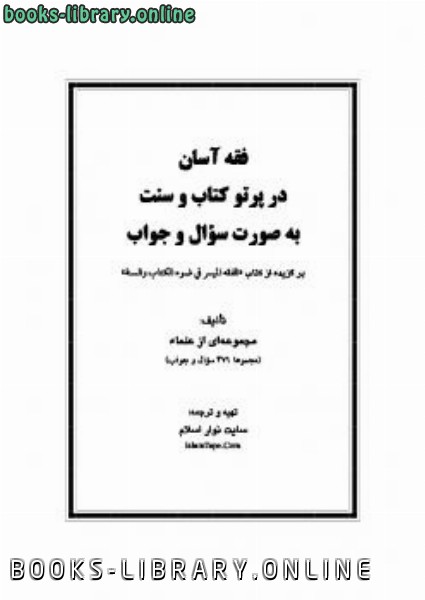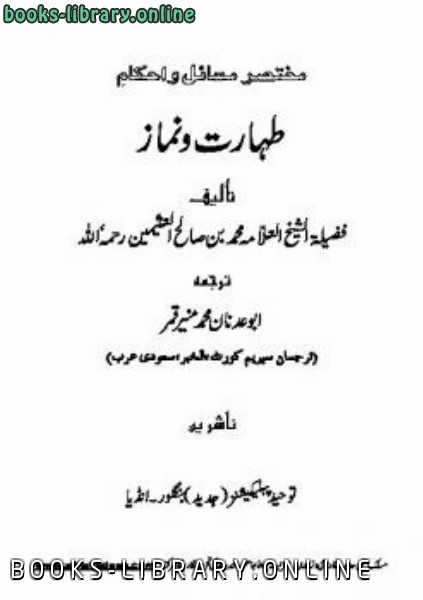كتاب Tawhid and Trinity A Study of Ibn Taymiyyah’s al Jawab al sahih
Ibn Taymiyyah left a considerable body of work characterized by its rich documentation, sober style, and brilliant polemic. In addition to innumerable fatÉwÉ (legal opinions), two works have received special attention: Al-SiyÉsat al-shar ≤ iyyah (Treatise on Juridical Politics) and Minhaj al-sunnah (The Way of Tradition). However, his six volume study, Al-JawÉb al-ØaÍÊÍ li Man Baddala DÊn al- MasÊÍ (the apt answer to the one who changed the religion of the Christ) also deserves equal attention. Ibn Taymiyyah also wrote five other treatises in response to Christianity. 8 However, this study focuses mainly on the methodology and the arguments advanced in Al-JawÉb al-ØaÍÊÍ. The Contents and the Method Al-JÉwab al-ØaÍÊÍ contains rich information on Islam, Christianity, and such extinct Islamic sects which were attracted to Christianity. This work was written in 1320 on public demand and in response to a short treatise of 24 pages entitled “A Letter to a Muslim” by Paul of Antioch, the Melkite Bishop of Saida. 9 This treatise, written after due consultation with Church leaders, attempts to establish six points. They claim that: (1) Prophet MuÍammad (SAS) was not sent to mankind, but rather to the pagan Arabs; (2) Prophet MuÍammad (SAS) extolled Christianity as a religion; (3) previous religions and scriptures bear testimony to the truth and validity of their religion; (4) Christians are monotheists; (5) their belief concerning the trinity is demonstrable by rational argumentation; and (6) Christianity as a religion is perfected by Jesus who came after Moses and hence they are not in need of any new message or religion. In response, Ibn Taymiyyah wrote the six volumes published by DÉr al- ≤ ÓÎimah publication, Riyadh. The first volume analyzes the Christians’ claim that MuÍammad (SAS) was sent only to the Arabs of the JÉhiliyyah period and argues that Prophet MuÍammad (SAS) was sent as a messenger for all mankind. The second volume attempts to prove that the Christians distorted ( taÍrÊf ) their scriptures and altered ( tabdÊl ) the tenets of their beliefs. The third and fourth volumes are devoted to the question of trinity explaining the doctrinal origins of this belief, its theological position, and revelational as well as rational grounds upon which this belief is based. He argues that the doctrine of the trinity is an innovation unsubstantiated by R ESEARCH N OTES 93 any authoritative injunctions. In the fifth volume, Ibn Taymiyyah presents epistemological questions on the Trinitarian concept, particularly on the logical relationship between the intellectual ( ≤ aql ) knowledge and the knowledge obtained from the revealed tradition ( naql ). The final volume summarises the arguments and concludes by showing the superiority and necessity of Islam, which is a perfect combination of all that is good and just. The book teaches the Muslims and others how to think when studying Christianity. It presents both logical and scriptural arguments in its refutation of Christianity. In the introduction to the volume, Ibn Taymiyyah makes it clear that his intention is not to list the Christian sects and their historical background, but to analyse their theological positions and concepts of God, trinity, incarnation and other Christian beliefs. His main objective is to substantiate the distinction between the creator and his creations. Since God is the “Realm Ideal Being” which is totally other than the realm of actual being or creation, He is really the one and only Transcendent being. His assessments are based both on scriptural and theological analyses. Though Al-JawÉb al-ØaÍÊÍ is concerned with Christianity that has deviated from the original teachings of its Prophet, it also discusses some heretical practices among the Muslims. He sought to show that the Christians’ errors in “changing the religion of Christ” was also prevalent among Muslims of earlier generations as well as his contemporaries. Ibn Taymiyyah calls them hypocrites and the innovators. Hypocrites are those who outwardly profess faith in all the teachings of the Prophet (SAS), but secretly loath his message, like the renegades ( malÉÍidah ) and the Batinis. Renegades, according to Ibn Taymiyyah, are in greater error than the Christians, whereas the innovators are those who profess the generality of the message of the Prophet (SAS) but are confused about the true teaching of Islam. Unless Muslims re Written by Ismail Abdullah, which is an important message to explain to us the error in the doctrine of Trinitarian Trials of the Christians, and in turn highlights the doctrine of Tawheed, and this letter is based on the book of Sheikh Islam Ibn Taymiyah God's mercy, known as the correct answer for those who replaced the religion of Christ, A lot of evidence and mental arguments and the minority that prove the distortion of the Christian religion, and the error and the obvious contradiction in the religion of the current character .اسماعيل عبد الله - في المسرح ترأس فريق العمل لتأسيس الهيئة العربية للمسرح منذ 4/6/2007، إلى أن تم تأسيسها في 10/1/2008. ترأس فريق العمل لإعداد الاستراتيجية العربية للتنمية المسرحية وتم إطلاقها واعتمادها من وزراء الثقافة العرب، يناير 2015 – الرياض. ترأس فريق العمل لإعداد استراتيجية تنمية وتطوير المسرح المدرسي في الوطن العربي والتي تم اعتمادها في 3 يونيو 2015. رئيس مجلس الأمناء والأمين العام للهيئة العربية للمسرح منذ 2008 إلى الآن. رئيس جمعية المسرحيين بدولة الإمارات منذ 2007 إلى الآن. مدير مهرجان المسرح العربي من 2009 إلى الآن. رئيس مهرجان الإمارات لمسرح الطفل من دورته الثالثة عام 2007 إلى الآن. رئيس مهرجان الإمارات للمسرح الجامعي 2010 إلى الآن. عضو اللجنة الاستشارية لمهرجان دبي لمسرح الشباب 2008، 2009، 2010. عضو اللجنة العليا المنظمة لأيام الشارقة المسرحية منذ 2007 إلى الآن. مدير المهرجان المسرحي الخليجي الثاني للأشخاص ذوي الإعاقة 2011. أسس فرقة مسرح خورفكان الشعبي 1979. ساهم في تأسيس المسرح الحر بجامعة الإمارات عام 1981م ساهم في تأسيس مسرح الطليعة بخورفكان 1986م عضو في اللجنة العليا الدائمة لدول مجلس التعاون الخليجي للفرق المسرحية الأهلية منذ تأسيسها ولغاية عام 1996 . عضو الهيئة الإدارية لمسرح أبوظبي. ❰ له مجموعة من الإنجازات والمؤلفات أبرزها ❞ Tawhid and Trinity A Study of Ibn Taymiyyah’s al Jawab al sahih ❝ ❱
من كتب إسلامية بلغات أخرى - مكتبة كتب إسلامية.

قراءة كتاب Tawhid and Trinity A Study of Ibn Taymiyyah’s al Jawab al sahih أونلاين
معلومات عن كتاب Tawhid and Trinity A Study of Ibn Taymiyyah’s al Jawab al sahih:
Taymiyyah left a considerable body of work characterized by
its rich documentation, sober style, and brilliant polemic. In addition
to innumerable
fatÉwÉ
(legal opinions), two works have received
special attention:
Al-SiyÉsat al-shar
≤
iyyah
(Treatise on Juridical
Politics) and
Minhaj al-sunnah
(The Way of Tradition). However,
his six volume study,
Al-JawÉb al-ØaÍÊÍ li Man Baddala DÊn al-
MasÊÍ
(the apt answer to the one who changed the religion of the
Christ) also deserves equal attention. Ibn Taymiyyah also wrote five
other treatises in response to Christianity.
8
However, this study
focuses mainly on the methodology and the arguments advanced in
Al-JawÉb al-ØaÍÊÍ.
The Contents and the Method
Al-JÉwab al-ØaÍÊÍ
contains rich information on Islam, Christianity,
and such extinct Islamic sects which were attracted to Christianity.
This work was written in 1320 on public demand and in response to
a short treatise of 24 pages entitled “A Letter to a Muslim” by Paul
of Antioch, the Melkite Bishop of Saida.
9
This treatise, written after
due consultation with Church leaders, attempts to establish six points.
They claim that: (1) Prophet MuÍammad (SAS) was not sent to
mankind, but rather to the pagan Arabs; (2) Prophet MuÍammad
(SAS) extolled Christianity as a religion; (3) previous religions and
scriptures bear testimony to the truth and validity of their religion;
(4) Christians are monotheists; (5) their belief concerning the trinity
is demonstrable by rational argumentation; and (6) Christianity as a
religion is perfected by Jesus who came after Moses and hence they
are not in need of any new message or religion.
In response, Ibn Taymiyyah wrote the six volumes published by
DÉr al-
≤
ÓÎimah publication, Riyadh. The first volume analyzes the
Christians’ claim that MuÍammad (SAS) was sent only to the Arabs
of the
JÉhiliyyah
period and argues that Prophet MuÍammad (SAS)
was sent as a messenger for all mankind. The second volume attempts
to prove that the Christians distorted (
taÍrÊf
) their scriptures and
altered (
tabdÊl
) the tenets of their beliefs. The third and fourth
volumes are devoted to the question of trinity explaining the doctrinal
origins of this belief, its theological position, and revelational as
well as rational grounds upon which this belief is based. He argues
that the doctrine of the trinity is an innovation unsubstantiated by
R
ESEARCH
N
OTES
93
any authoritative injunctions. In the fifth volume, Ibn Taymiyyah
presents epistemological questions on the Trinitarian concept,
particularly on the logical relationship between the intellectual (
≤
aql
)
knowledge and the knowledge obtained from the revealed tradition
(
naql
). The final volume summarises the arguments and concludes
by showing the superiority and necessity of Islam, which is a perfect
combination of all that is good and just. The book teaches the Muslims
and others how to think when studying Christianity. It presents both
logical and scriptural arguments in its refutation of Christianity.
In the introduction to the volume, Ibn Taymiyyah makes it clear
that his intention is not to list the Christian sects and their historical
background, but to analyse their theological positions and concepts
of God, trinity, incarnation and other Christian beliefs. His main
objective is to substantiate the distinction between the creator and
his creations. Since God is the “Realm Ideal Being” which is totally
other than the realm of actual being or creation, He is really the one
and only Transcendent being. His assessments are based both on
scriptural and theological analyses.
Though
Al-JawÉb al-ØaÍÊÍ
is concerned with Christianity that has
deviated from the original teachings of its Prophet, it also discusses
some heretical practices among the Muslims. He sought to show
that the Christians’ errors in “changing the religion of Christ” was
also prevalent among Muslims of earlier generations as well as his
contemporaries. Ibn Taymiyyah calls them hypocrites and the
innovators. Hypocrites are those who outwardly profess faith in all
the teachings of the Prophet (SAS), but secretly loath his message,
like the renegades (
malÉÍidah
) and the Batinis. Renegades, according
to Ibn Taymiyyah, are in greater error than the Christians, whereas
the innovators are those who profess the generality of the message
of the Prophet (SAS) but are confused about the true teaching of
Islam. Unless Muslims re
Written by Ismail Abdullah, which is an important message to explain to us the error in the doctrine of Trinitarian Trials of the Christians, and in turn highlights the doctrine of Tawheed, and this letter is based on the book of Sheikh Islam Ibn Taymiyah God's mercy, known as the correct answer for those who replaced the religion of Christ, A lot of evidence and mental arguments and the minority that prove the distortion of the Christian religion, and the error and the obvious contradiction in the religion of the current character
.
للكاتب/المؤلف : اسماعيل عبد الله .
دار النشر : .
سنة النشر : 2006م / 1427هـ .
عدد مرات التحميل : 7719 مرّة / مرات.
تم اضافته في : الأربعاء , 27 مارس 2019م.
حجم الكتاب عند التحميل : 104.2 كيلوبايت .
تعليقات ومناقشات حول الكتاب:
ترك ابن تيمية مجموعة كبيرة من الأعمال التي تتميز
بتوثيقها الغني وأسلوبها الرصين والجدل اللامع. بالإضافة
إلى عدد لا يحصى
<�ont style="vertical-align: inherit;">fatÉwÉ
(الآراء القانونية)، وتلقى عملين
اهتماما خاصا:
آل SiyÉsat الشرع
≤
iyyah
(الاطروحه على القضاء
السياسة) و
منهاج آل السنة
(الطريق من التقليد). ومع ذلك ، فإن
دراسته ذات الستة مجلدات ،
"الجويب القديم لرجل بدالة الدين الماسي" (الإجابة
الملائمة
لمن غير دين
المسيح) تستحق الاهتمام نفسه. كما كتب ابن تيمية خمسة
أطروحات أخرى ردا على المسيحية.
8
ومع ذلك ،
تركز هذه الدراسة بشكل أساسي على المنهجية والحجج المقدمة في
جويب الجواب.
المحتويات والطريقة
: جواب الأصحاب
يحتوي على معلومات غنية عن الإسلام والمسيحية
ومثل هذه الطوائف الإسلامية المنقرضة التي انجذبت إلى المسيحية.
كُتب هذا العمل عام 1320 بناءً على طلب عام واستجابة
لأطروحة قصيرة من 24 صفحة بعنوان "رسالة إلى مسلم" كتبها بولس
الأنطاكي ، أسقف صيدا الملكيين.
9
هذه الرسالة ، التي كُتبت بعد
التشاور الواجب مع قادة الكنيسة ، تحاول تحديد ست نقاط.
يزعمون أن: (1) النبي محمد (صلى الله عليه وسلم) لم يرسل
للبشرية بل إلى العرب الوثنيين. (2) النبي محمد صلى الله عليه وسلم
أشاد بالمسيحية كدين. (3) الأديان
والكتب المقدسة السابقة تشهد على حقيقة وصحة دينهم ؛
(4) المسيحيون موحدون. (5) إيمانهم بالثالوث
يمكن إثباته بالحجج العقلانية. و (6) المسيحية
كدين أتقنها السيد المسيح الذي جاء بعد موسى وبالتالي فهم
ليسوا بحاجة إلى أي رسالة أو دين جديد.
وردا على ذلك، كتب ابن تيمية في ستة مجلدات نشرته
دير آل
≤
يمة للنشر ، الرياض. المجلد الأول يحلل
مطالبة المسيحيين أن MuÍammad (SAS) وأرسلت فقط للعرب
من
JÉhiliyyah
فترة ويجادل بأن النبي MuÍammad (SAS)
أرسل رسولا للبشرية جمعاء. يحاول المجلد الثاني
إثبات أن المسيحيين شوهوا (
تحريف
) كتبهم المقدسة وغيّروا
(
تابدل
) مبادئ معتقداتهم.
يُخصص المجلدان الثالث والرابع لمسألة الثالوث التي تشرح
الأصول العقائدية لهذا الاعتقاد ، وموقعه اللاهوتي ،
والأسس الوحيوية والعقلانية التي يقوم عليها هذا الاعتقاد. انه يجادل
أن عقيدة الثالوث هي ابتكار لا أساس له من قبل
R
ESEARCH
N
OTES
93
أي أوامر رسمية. في المجلد الخامس ،
يقدم ابن تيمية أسئلة معرفية حول مفهوم الثالوث ،
لا سيما العلاقة المنطقية بين المعرفة الفكرية (
≤
العقل
)
والمعرفة المستمدة من التقليد الموحى
(
النقل
). يلخص المجلد الأخير الحجج ويختتم
بإظهار تفوق الإسلام وضرورته ، وهو
مزيج مثالي من كل ما هو جيد وعادل. الكتاب يعلم المسلمين
وآخرين كيف يفكرون عند دراسة المسيحية. يقدم
الحجج المنطقية والكتابية في دحضه للمسيحية.
يوضح ابن تيمية في مقدمة المجلد
أن نيته ليست سرد الطوائف المسيحية
وخلفيتها التاريخية ، ولكن لتحليل مواقفهم الدينية ومفاهيمهم
عن الله والثالوث والتجسد والمعتقدات المسيحية الأخرى. هدفه الرئيسي
هو إثبات التمييز بين الخالق
وإبداعاته. نظرًا لأن الله هو "الكائن المثالي للمملكة" والذي يختلف تمامًا
عن عالم الوجود الفعلي أو الخلق ، فهو حقًا
والوجود المتعالي فقط. تستند تقييماته إلى
التحليلات الكتابية واللاهوتية.
على الرغم من أن
الجويب العتيق
يهتم بالمسيحية التي
انحرفت عن تعاليم نبيها الأصلية ، إلا أنها تناقش أيضًا
بعض الممارسات الهرطقية بين المسلمين. لقد سعى لإثبات
أن أخطاء المسيحيين في "تغيير دين المسيح" كانت
سائدة أيضًا بين المسلمين من الأجيال السابقة وكذلك
معاصريه. يسميهم ابن تيمية المنافقين
والمبدعين. المنافقون هم أولئك الذين يؤمنون ظاهريًا بجميع
تعاليم النبي صلى الله عليه وسلم ، لكنهم يكرهون رسالته سرًا ،
مثل المرتدين (
malÉÍidah
) وBatinis. المرتدون ، حسب
ابن تيمية ، أخطأوا أكبر من المسيحيين ، في حين
أن المبتدعين هم أولئك الذين يصرحون بعمومية رسالة
النبي (صلى الله عليه وسلم) لكنهم مرتبكون بشأن التعاليم الصحيحة
للإسلام. ما لم يعيد المسلمون
بقلم إسماعيل عبد الله ، وهي رسالة مهمة تشرح لنا الخطأ في عقيدة التثليث لمحاكمات المسيحيين ، وفي المقابل تسلط الضوء على عقيدة التوحيد ، وهذه الرسالة مبنية على كتاب الشيخ إسلام ابن تيمية رحمه الله. والمعروف باسم الجواب الصحيح لمن حل محل دين المسيح ، الكثير من الأدلة والحجج العقلية والأقلية التي تثبت تحريف الدين المسيحي ، والخطأ والتناقض الواضح في الديانة الحالية
.
 مهلاً !
مهلاً !قبل تحميل الكتاب .. يجب ان يتوفر لديكم برنامج تشغيل وقراءة ملفات pdf
يمكن تحميلة من هنا 'تحميل البرنامج'

نوع الكتاب : pdf.
اذا اعجبك الكتاب فضلاً اضغط على أعجبني و يمكنك تحميله من هنا:


كتب اخرى في كتب إسلامية بلغات أخرى
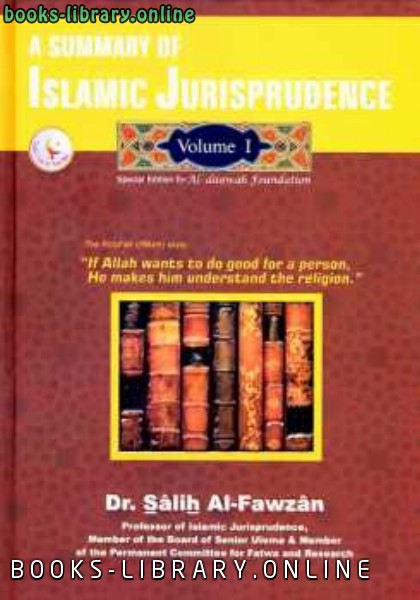
A Summary of Islamic Jurisprudence PDF
قراءة و تحميل كتاب A Summary of Islamic Jurisprudence PDF مجانا
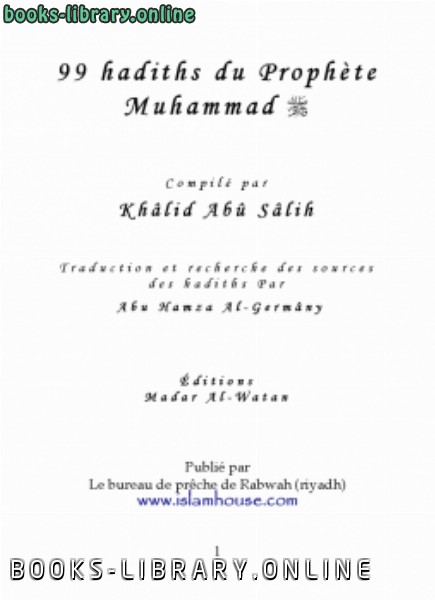
99 hadiths du Proph egrave te Muhammad PDF
قراءة و تحميل كتاب 99 hadiths du Proph egrave te Muhammad PDF مجانا
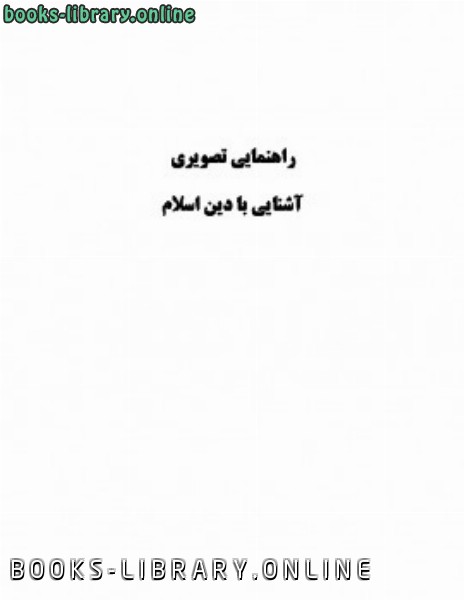
راهنمایی تصویری آشنایی با دین اسلام PDF
قراءة و تحميل كتاب راهنمایی تصویری آشنایی با دین اسلام PDF مجانا
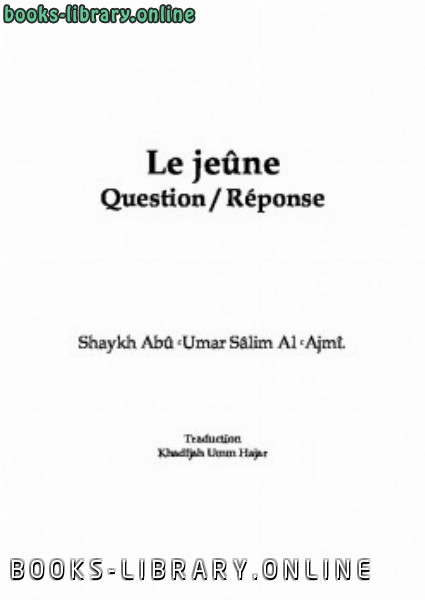
Le je ucirc ne en questions/r eacute ponses PDF
قراءة و تحميل كتاب Le je ucirc ne en questions/r eacute ponses PDF مجانا

The Devil rsquo s Deception Talbees Iblees PDF
قراءة و تحميل كتاب The Devil rsquo s Deception Talbees Iblees PDF مجانا
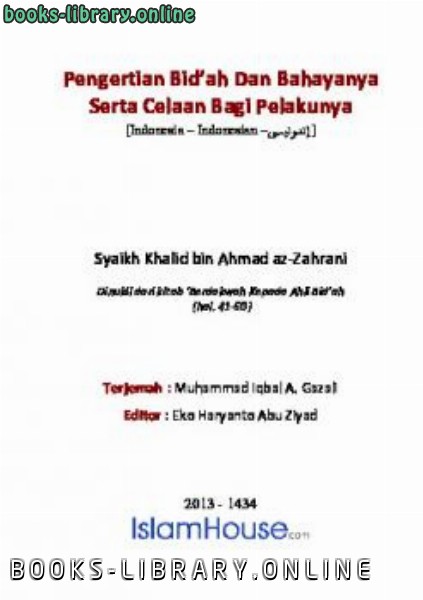
Pengertian Bid rsquo ah Dan Bahayanya Serta Celaan Bagi Pelakunya PDF
قراءة و تحميل كتاب Pengertian Bid rsquo ah Dan Bahayanya Serta Celaan Bagi Pelakunya PDF مجانا
